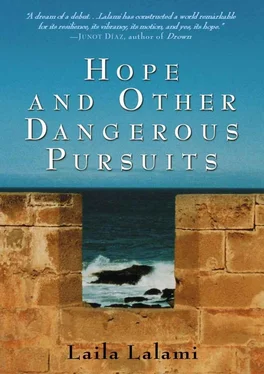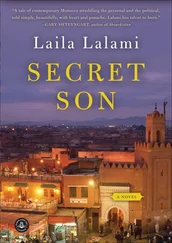When he’d returned to Tangier a year before, Murad had gone home and refused to go out. He avoided family gatherings, refused to run errands, turned down offers to play soccer with the neighbors. Everyone knew he’d tried to go to Spain, and now they all knew he’d been caught and deported, so he took to staying home with his mother, forsaking even a glass of tea at the Café La Liberté with the other unemployed young men from the neighborhood. He watched his mother as she worked around the house, cleaning or cooking, her bracelets clinking with every movement of her wrists. He’d waited for a reasonable amount of time to pass before he’d asked her for them, asked her to sell them and lend him the money so he could try to go to Spain again. “Have you lost your mind?” she’d said. “Haven’t you learned your lesson? I would never do it, so don’t ask me again.” But Murad asked her again and again, and each time she ignored him. “Can you pass the bread?” she’d say, or, “It looks like it’s going to rain.” She acted as though she was doing him a favor by glossing over an indiscreet remark on his part. It was infuriating, being ignored like this. By then he was spending a lot of time alone with her at home, his sister having married and moved out, the twins still away in college, and his younger brother in school most of the day. They were like an old couple, having breakfast together, watching TV together, increasingly accustomed to the sounds they made throughout the day — the gurgling of the water she used for her ablutions, the creaking of the cabinet door he opened to get his shirts. When his brother-in-law, Lamya’s husband, told him that one of his clients, an old man whose children had immigrated to Israel, needed help at his shop, Murad had jumped on the offer.
Even after he took the job, Murad couldn’t help but wonder what lay ahead. If he hadn’t set foot in Spain, it would have been easier to dismiss his fantasies of what could have been; but he had made it to Tarifa, so every day he daydreamed about the life he thought he would have had. Now, he realized, he’d had it wrong. He’d been so consumed with his imagined future that he hadn’t noticed how it had started to overtake something inside him, bit by bit. He’d been living in the future, thinking of all his tomorrows in a better place, never realizing that his past was drifting. And now, when he thought of the future, he saw himself in front of his children, as mute as if his tongue had been cut off, unable to recount for them the stories he’d heard as a child. He wondered if one always had to sacrifice the past for the future, or if it was something he had done, something peculiar to him, an inability to fill himself with too much, so that for every new bit of imagined future, he had to forsake a tangible past.
“It’s gorgeous,” Chrissa whispered.
“Muy lindo,” Anas said.
Chrissa smiled politely, looking up at the geometric motif. Sandy sighed. “Well, now that he’s here, you might as well ask him what part of Morocco the rug is from.”
Chrissa turned to Anas and in accented Spanish asked him Sandy’s question. She waited to hear the answer and then translated for Sandy. “From Nader? Nador? Someplace like that.”
“Ah. Traditional Berber rugs are usually warm-colored like this one. And look at the animal motifs. Brings to mind some of those Native American drawings, doesn’t it?”
Chrissa nodded in agreement.
The carpet came from a small workshop that had been doing business with Botbol Bazaar for more than twenty years. The owner had died only two months ago, and it was his son who’d brought the latest shipment, carrying each rug into the shop himself. The memory triggered another one, and so Murad remembered another story his father had told, about a young rug weaver and the revenge he took on the man who’d stolen his beloved.
“¿Quieren un te?” Anas asked.
“Oh, I don’t know if it’s necessary,” Chrissa said. “He’s asking if we want tea.”
“I understood that,” Sandy said. “Trust me, they want you to have tea.”
Chrissa seemed to doubt her friend, but deferred to her anyway.
“Si,” Sandy said to Anas, forcefully nodding her head.
Anas smiled and signaled to Murad that he was going to get the tea.
“You’re probably going to get suckered into buying something anyway,” Sandy said, “so we might as well have a cup of tea while we’re here.” She sat down on a chair in the corner and looked around her. “Maybe later we can stop by one of the cafés where Bowles used to hang out,” she said brightly. Suddenly noticing an old leather trunk to her right, she bent over it, admiring the patterns made by the nails. With her finger, she wrote something in the layer of dust.
Chrissa, who’d been sitting quietly with her purse on her lap, turned to look at Murad and, knowing he had seen this, gave him an apologetic look. Murad smiled at her and came out from behind the counter. He wheeled a round tea table over and set it on its legs in front of the girls. “Welcome, welcome,” he said.
If she was surprised, Sandy didn’t let on, as though she had expected him to speak English all along.
“Really, there’s no need for tea,” Chrissa said.
“Please,” he said, “it’s a pleasure.” He sat down, crossed his legs. “So you’re interested in Paul Bowles?” he asked.
“Sure,” said Sandy, her face lighting up. “Have you read him?”
Murad nodded.
“I love his books,” she said, waving a fly away from her face. Her green eyes were lined with kohl. “He’s such a wonderful storyteller.”
“Shall I tell you a story, then, while we wait for tea?” Murad asked.
Sandy’s eyes sparkled with interest, and glancing delightedly at Chrissa, she said, “Sure!”
“Once there was, and there was not, a rug weaver named Ghomari. He was known and admired throughout the land for the tapestries he weaved, and people came from far and wide to buy his work. Ghomari was in love with a beautiful young woman, who was promised to him. She was the daughter of the muezzin and her name was Jenara. From time to time, Jenara would come watch Ghomari work, and she would ask him how long it would take before he would save enough money for her dowry. ‘I have to sell ten more carpets,’ he’d say, or, ‘Only seven more, my love,’ and invariably she would say, ‘Hurry up and sell them, then, so we can get married.’
“One day Jenara had come to watch Ghomari work in his shop in the middle of the afternoon. It was unbearably hot, and so young Jenara sat with her back to the street and unveiled her face. At that moment, the midget Arbo, who was as ugly as he was evil, happened by, and when he saw that Ghomari was busy talking to someone whom he couldn’t see, he jumped inside the shop and saw Jenara unveiled. He was struck dumb by her beauty, and he was still speechless when Ghomari, cursing him, threw him out of the shop.
“From then on, Arbo harassed young Jenara, wherever she was, whether she was on her way to the market or going to the hammam, making declarations of love. Jenara yelled at him. ‘I would rather be dead than become your wife.’ Arbo walked away, already fomenting ways in which he could get revenge. He went to his master, the Sultan, and told him he’d seen the most beautiful woman in the entire kingdom, but she was promised to a simple rug weaver. Hearing this, the Sultan said, ‘How can a rug weaver have a more beautiful wife than I? Do what you must.’ And so Arbo waited for the muezzin to be up on the minaret making the call to kidnap Jenara and take her into the Sultan’s harem. The poor girl spent her days crying over her forced marriage to the brutal Sultan, and none of the gifts the Sultan bestowed on her could quiet her crying.
Читать дальше












